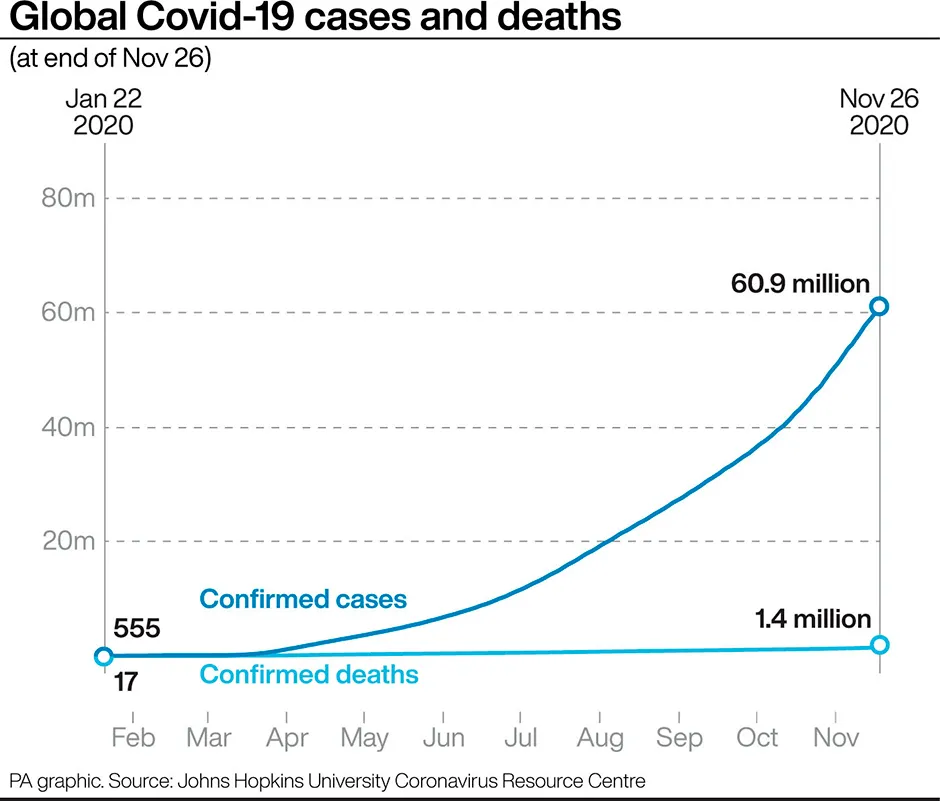A rapid coronavirus test that gives results in 20 minutes has been confirmed as having high sensitivity to the virus, according to the government.
An evaluation carried out by NHS trusts and universities found the OptiGene RT-Lamp test to be effective in identifying infectious cases, including for people not displaying symptoms.
The findings follow a report by The Guardian earlier this month that the test identified only 46.7 per cent of infections during a trial in Manchester and Salford.In a letter seen by the newspaper, scientists from Greater Manchester’s mass testing group (MTEG) said they had “significant concerns” and felt the data did not support a large-scale rollout of the tests to staff in clinical settings.
The Department of Health and Social Care (DHSC) said that as part of a strategy to deliver asymptomatic testing, the test was used for NHS staff and in pilots in Southampton, including at the University of Southampton.
Read the latest coronavirus news:
- COVID-19 Christmas rules: 'Benefits justify the risks', expert claims
- COVID-19 vaccine UK: Everything you need to know about the new coronavirus jabs
- AstraZeneca/Oxford: How long until we can be vaccinated?
Initial results from the pilots showed the test as effective in identifying positive cases and breaking chains of transmission, according to the department.
The effectiveness of a test is measured by two parameters: sensitivity and specificity. Sensitivity is the fraction of positive cases that the test successfully identifies, whereas specificity is the fraction of negative cases it identifies correctly.
The test was found to have a sensitivity of 79 per cent and specificity of 100 per cent, meaning it is effective in identifying cases who are infectious and are most likely to transmit the disease, the DHSC said. That is, out of 100 positive cases, the test correctly identifies 79, and out of 100 negative cases, it catches them all.
In samples with a higher viral load, the sensitivity of the test increased to 94 per cent for saliva and 100 per cent for swabs.
Pregnancy-style lateral flow tests that give results in minutes and can be carried out without supervision are part of a pilot mass testing scheme in Liverpool.
But some experts have urged caution, saying rapid tests are not as accurate as standard swab tests processed in a lab, and could result in people who are infectious being told they are not.
The government said that unlike the standard tests, OptiGene RT-Lamp tests do not require sequential changes of temperature and so can produce results more rapidly.

“With up to a third of individuals with COVID-19 not displaying symptoms, we are rolling out asymptomatic testing to protect those at highest risk," said Lord James Bethell, Parliamentary Under Secretary of State at the Department of Health and Social Care.
“By broadening testing to identify those showing no symptoms and who can infect people unknowingly, we can find positive cases more quickly and break chains of transmission.
“We are using the latest technology to do this, and the country’s leading scientists have rigorously evaluated the Optigene Lamp test in the lab and in the field and confirmed its sensitivity for asymptomatic testing.”
Professor Keith Godfrey, of the University of Southampton MRC Lifecourse Epidemiology Unit, who led the first phase of the Southampton saliva testing pilot, said the test was “very easy for students to use”.
“During the pilot, with regular testing and participation rates exceeding 80 per cent among the school staff and students, there has been no evidence of any transmission of infection within the schools involved,” he said.“Feedback from students, staff and parents has been amazingly positive.”
How can I protect myself from the coronavirus when shopping?
You’ll have seen signs in your local supermarket advising you to keep two metres from others while moving around the store. This is key to reducing your chances of catching the virus while shopping.
The coronavirus SARS-CoV-2 is spread through respiratory droplets that leave our mouth and nose when we cough, sneeze, or sometimes even talk. The droplets sprayed out by an infected person will contain the virus, which could then enter your body via your mouth, nose or eyes (this is why you shouldn’t be touching your face).
Respiratory droplets don’t usually travel more than one metre, so by keeping two metres from others, you’ll reduce the likelihood of being in the firing line. To make it easier to keep your distance, try to shop during off-peak hours, choose a store that’s limiting the number of people who can be inside at any one time, and use self-checkout if you can.
Keeping your hands clean is the other main thing you can do. If possible, wipe the trolley or basket handles with a disinfectant wipe when you arrive at the store. When you get home, wash your hands or use hand sanitiser before and after unpacking your bags.
A US study found that the coronavirus can survive for up to 24 hours on cardboard, and up to three days on hard, shiny surfaces such as plastic, so wiping down your purchases with a disinfectant spray or a soapy cloth before you put them away is another good habit to get into.
Read more: